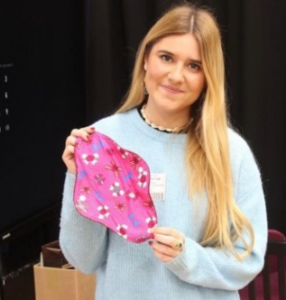Gloria Orwoba transformed a controversial protest in Kenya’s Parliament into tangible policy change, securing $7.3 million in funding for menstrual products while challenging deep-rooted stigmas about periods.

In February 2023, Kenyan Senator Gloria Orwoba sparked intense debate when she entered Parliament wearing a white suit with a visible menstrual stain. While initially asked to leave the chamber for violating dress code, Orwoba turned this moment of controversy into a catalyst for change.
A year and a half later, her advocacy yielded significant results. She successfully negotiated to double the national budget for menstrual products to 940 million Kenyan shillings (about $7.3 million), ensuring broader access to sanitary pads in schools and prisons. “This is what you can do with this position, as a woman in power,” Orwoba said in an interview with Harvard Public Health Magazine, reflecting on her transition from activist to legislator.
Her campaign revealed unexpected alliances and obstacles. Male legislators proved more supportive of her menstrual health initiatives than female colleagues, who Orwoba found often competed rather than collaborated. The backlash to her protest included cyberbullying and threats of sexual violence, highlighting the deeply entrenched stigma she sought to address.
Beyond legislation, Orwoba launched the Glo’s Pad Bank, a grassroots initiative allowing direct donations of menstrual products. She’s now working to establish Africa’s first menstruation museum, aiming to educate future generations about the history and significance of menstrual health. She is also working to create a local nonprofit sanitary pad factory in Kenya which she hopes will create jobs for women in vulnerable communities as well as provide access to affordable, high-quality sanitary pads to girls and women in schools and prisons.
The impact of her work is particularly crucial in Kenya, where ministry data shows only 65% of urban women and 46% of rural women have access to disposable menstrual products. Her efforts address both practical needs and cultural attitudes.
Read the full interview in Harvard Public Health Magazine, published December 4, 2024, written by Lenny Rashid Ruvaga:
Read these articles to learn more about Senator Gloria Orwoba and the impact of her stained pants:
- BBC: Gloria Orwoba: Kenyan senator asked to leave over ‘period stain’
- PBS: With stained pants, Kenyan Senator Gloria Orwoba fights menstruation taboo
- The Guardian: Kenyan senator targeted by online threats after period poverty protest
Watch this video highlighting period poverty in Kenya and some of the women working to overcome it:
Related Articles

Teenage Twins Turn Period Poverty Fight Into National Movement, Receiving CNN Heroes Recognition
Twin activists Brooke and Breanna Bennett transformed their grassroots campaign against period poverty into a statewide policy victory and national recognition, delivering essential supplies to thousands.

Addressing “Period Poverty” in Lebanon’s Refugee Camps
Jigsaw, a UK charity, partners with local organizations to distribute menstrual products and provide crucial health education in Lebanon’s refugee camps, tackling period poverty and empowering women and girls to manage their health with dignity.

Menstrual Health Advocacy in Cameroon
In Cameroon, a youth-led nonprofit is combating period poverty and reproductive health ignorance by providing education and affordable menstrual products to vulnerable girls in rural communities.
